VIDEO FEATURE & WEB-EXCLUSIVE INTERVIEW
Musician: BILLY RAY CYRUS
Video: “Thin Line” featuring Shelby Lynne
Songwriter: Billy Ray Cyrus
Billy Ray Cyrus is a singer-songwriter, actor and philanthropist—helping many charities, including veterans and military families. We talked with Cyrus about his new album two days after his performance of the 1992 hit “Some Gave All” at the Tennessee Titans’ opener on Sunday, 9/11/16. Before the interview, we casually asked him about that performance. And the interview quickly changed direction. He said “performing that song was beyond surreal. It was so powerful. The past filled with the present. There were so many family members and widows—firefighters, police and others who have sacrificed so much. It was a very powerful moment.” It touched him emotionally. He went on to tell us about filming Doc, the PAX television series in September 2001: “15 years ago, on that morning, I stood in Toronto, Canada. It was day one of season two, opening scene of the first episode titled ‘Some Gave All.’ In the opening scene, I was standing next to a Vietnam Veteran, who lived in a concrete box. And the first time he said ‘concrete box’—that’s when the first plane hit. And the next time he said ‘concrete box’—the second plane hit. All in a matter of 11 minutes—the whole world changed.”
“They later did a two-hour special Some Gave All and interviewed real veterans and real firefighters. First time I came back to America after shooting the show in Toronto, I was flying into New York City—to be on a Thanksgiving Day float. I had boots and helmets, and sang ‘Some Gave All.’ And now, 15 years later, I’m standing in the Titans stadium with just my guitar, paying tribute to America. It’s for our troops and the men and women who are in uniform—honoring their sacrifice. This wasn’t about getting knocked down. It is about getting back up.”
“Oh, hold on. It gets even stranger. I was on Broadway when Hurricane Sandy hit. I was finally playing the lead in Chicago, and that hurricane paralyzed the city. But guess what? The city got back up! I have seen this city get back up twice! I’m not saying this because I’m a New Yorker. I’m saying it because I witnessed it.”
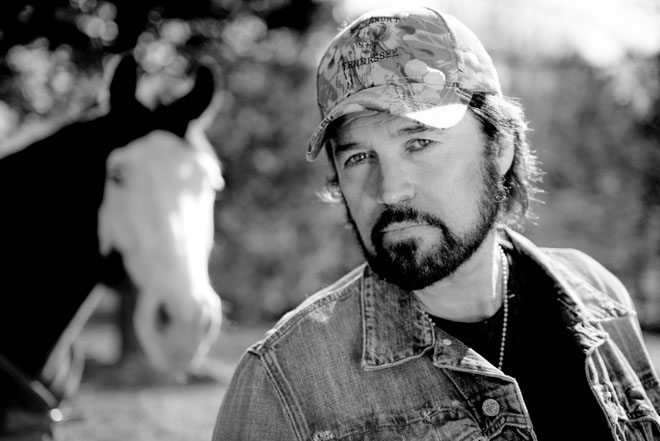
Photo credit: Melanie Swerdan
“This is way more important than the interview we were scheduled to talk about, and you can quote me on that. In fact, I would really appreciate it if you could place this at the front of the feature. I feel that strongly about it. Don’t worry. I’ll answer your other questions. We’ll extend our interview time and make sure I answer all your questions. But this is the first time I’ve had a chance to talk about this, and I want people to know about how we are as Americans—we are strong, and we work together to get back up.”
Earlier this month, Cyrus released his 14th album, Thin Line, on Blue Cadillac Music label. “This project was going to be a tribute album to my favorite songwriters and artists,” said Cyrus, hence the amount of classic Highwaymen ballads. “But it transformed into more than that.” The Highwaymen was a country music super-group from 1985-1995 featuring the genre’s biggest artists known for pioneering outlaw country subgenre: Johnny Cash, Waylon Jennings, Willie Nelson and Kris Kristofferson. That’s one of the reasons it was so special for Cyrus to have Shooter Jennings appear on the album as a producer and performer on tracks “Killing the Blues” and his father’s “I’ve Always Been Crazy”— a moment which came full circle for Cyrus since Waylon Jennings once told him he should sing the tune.
The new album Thin Line is packed with 15 tracks featuring collaborations with Aerosmith guitarist Joe Perry on the Don Williams’ classic “Tulsa Time.” He teamed with his son Braison Cyrus to honor one of his heroes—the late Merle Haggard with “Going Where the Lonely Go.” The title track is even more powerful with complementing harmonies by Shelby Lynne. Cyrus says, “This song describes how I live my life—it’s a balance between art and reality. And Shelby Lynne’s velvet voice is icing on the cake.”
The song “Thin Line” came to Cyrus three years ago, after a meeting in New York City with CMT when they said they were picking up his new show, Still the King. One of the executives in the room asked him to describe the show in one sentence, and he instinctively said, “Well, it’s like a thin line between Elvis and Jesus.” Cyrus always keeps a guitar with him, and he wrote the song that night in his hotel room.
As a writer and executive producer of the series, Cyrus also stars as “Burnin’” Vernon Brown, a one-hit wonder turned Elvis-impersonator struggling to get back on his feet. After a run-in with the law, Brown is sentenced to community service and ends up masquerading as the community’s new preacher, and re-connecting with his old flame, and a daughter he didn’t know about. Cyrus’ co-stars include Joey Lauren Adams, comedian/actor Kevin Farley (the late Chris Farley’s brother) and Madison Iseman—along with cameos by Randy Travis, Darius Rucker, Wayne Newton, Erik Estrada, John Corbett, and more.
We talked with Billy Ray Cyrus about his love for songwriting, and the creative driving force behind his music.
BILLY RAY CYRUS Web-Exclusive Interview
with M Music & Musicians magazine publisher, Merlin David
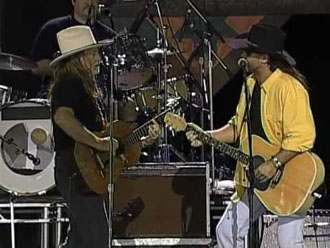
Billy Ray Cyrus with Willie Nelson
How did the idea of the song “Thin Line” come to you?
I was asked to describe my television show, Still the King, and thought, “Well, it’s a thin line between Elvis and Jesus.” Bam! That was the kick-start behind the idea. The usage of “thin line” shows that the parallel between ideas is not as far as typically perceived—and personally describes how I live my life. It’s a balance between art and reality. Plus, Shelby Lynne’s velvet voice is icing on the cake.
What is the inspiration of this new album, Thin Line—and how did it evolve?
The album was originally supposed to be a tribute album, a tip of the hat to my heroes—hence the amount of Highwaymen covers. But I just kept getting inspiration, and I’m a songwriter through and through. I can’t help it.
What is your creative process for writing songs?
I don’t push it. I allow for creativity to take a natural pace. When inspiration is sparked, that’s when I dip into my bag of tricks.
How do you keep song ideas fresh—and continue to think of new ideas?
I turn to personal experience and the day-to-day relationships in my life, and hopefully I am able to connect with others. I try to stay relative but remain true to myself and my beliefs.
Tell us one experience where something unique inspired you to write a song.
In relation to this album, about two years ago, I was invited by Dave Stewart to sing “Hey Jude” at the Hollywood Bowl’s three-day 50th anniversary concert for the Beatles. That third day was special because it was my birthday, and my gift to myself was the idea for “Our Song.” It just came to me and made sense. “Hey Jude” in a way is ‘our song’ (the song of popular culture), and I began thinking of couples who have a special song, and the lyric wrote itself.
What songwriting tip would you like to offer?
To always be honest. Honesty is my main ingredient.
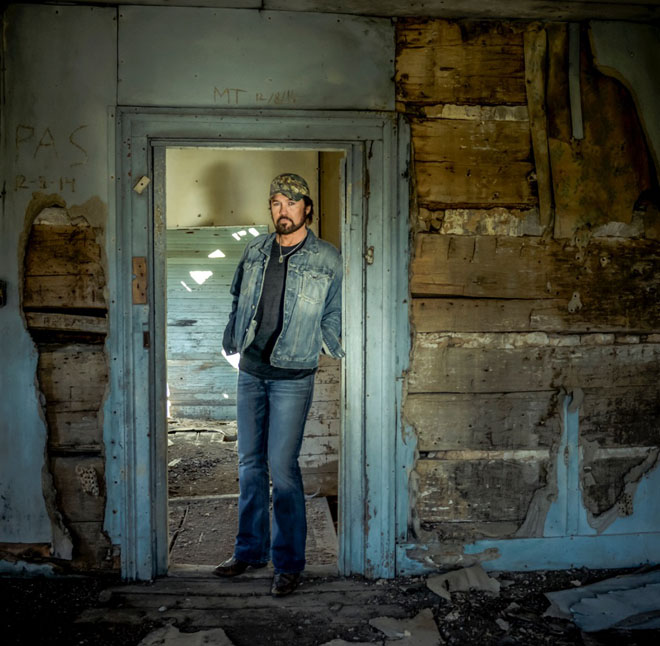
Photo credit: Melanie Swerdan
Who influenced you to pick up the guitar, and how old were you?
My dad, Ron Cyrus. He was in a quartet called The Crownsmen, and he also played guitar. I became frustrated as a kid when I couldn’t comfortably play his guitar and it was then I realized I needed a left-handed instrument.
Who inspired you to write songs?
My family. My dad specifically, but my parents were divorced by the time I was five. I definitely needed music to cope with that.
Top 5 Musicians or Songwriters who inspired you to become a musician?
The Highwaymen, Merle Haggard, Lynyrd Skynyrd, Elvis Presley, and Ron Cyrus.
The Highwaymen and your Dad seem to be a strong influence with your life in music.
I just set the album of the Highwaymen beside my dad’s Crownsmen album. There is really a thin line between the two bands—great songs and great music that also entertained people.
Where were you the first time you heard one of your songs on the radio—how did it feel?
Oh, probably my Chevy Beretta. I lived out of my car in the early nineties, and I was just ecstatic to have been given the opportunity that I’d been working on for the past decade.
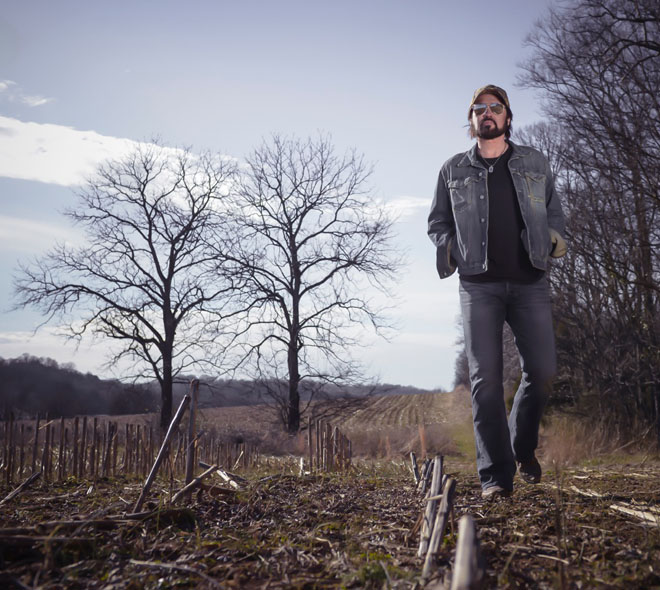
Photo Credit: Melanie Swerdan
Tell us about a time when you shared the stage with a music hero.
Willie Nelson, at Farm Aid in 1995. We sang a song I wrote in support of him in the early nineties that will actually be released on Thin Line called “Stop Picking on Willie.”
What is your best memory of creating your 9x multi-platinum 1992 debut album Some Gave All—that sold 20 million copies worldwide and scored eight top ten singles on the Billboard Country Songs chart?
I was finally able to do what I was cut out to do. It happened so quickly once it did, and I am so thankful that I was able to write and sing my own words—and words of some dear friends who I am so grateful for. But that Single of the Year award from the CMA in 1992 was definitely a statement and something to be proud of.
It took a while to get your music recorded.
All these years later the song “Some Gave All” is still so important to me. It was at 30 years old, after 10 years of being told “No”—that’s why I relate to the underdog. That aspect of getting back up means a lot to me. After 10 years of failure—trying to get a record deal, I had one more try. It was that inner voice speaking. I was given an appointment with Harold Shedd at Mercury Records, and I played “Some Gave All.” It was my last shot. I said to myself, it’s either this, or I’m going to work for the railroad, coal mine or steel mill. And finally, after 10 years, a man stood up and said, “Yes,” and it was “Some Gave All” that opened the door. I met Sandy Kane, that Vietnam Vet, in 1989—who inspired me. It was an amazing three days of writing. I wrote “Wher’m I Gonna Live?” on Tuesday, “She’s Not Cryin’ Anymore” on Wednesday, and “Some Gave All” on Sunday. All three songs had a very important part in my life.
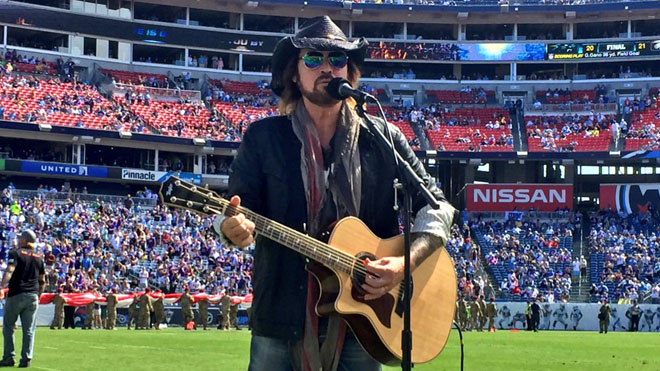
Did “Some Gave All” come easily or did it take a long time to write?
I have a little recorder, and I kept it on, and the words just flowed. I was in our house in Ironton, OH (in southern Ohio), and I was sitting there—stunned. I walked straight in my door, and played it. The whole verse and whole chorus came to me in one moment. The song “Thin Line” came the identical way. Ironically, I was in New York City three years ago when CMT said they were picking up Still the King. One of the executives in the room asked me to describe the show in one sentence, and I instinctively said, ‘Well, it’s like a thin line between Elvis and Jesus.’ I always keep a guitar with me. This time it was a guitar I had rented while I was there for meetings. I wrote the song that night in my hotel room. The same night, I was meeting John Varvatos—was running late. I was wearing his clothes for years. He’s a creative hero—a musician and an actor. The expression of his art is in his clothes. He showed me pictures of Willie Nelson and Lukas Nelson—from a clothing photo shoot. The words “Willie and the Lord” came to me. People think I say law. (Laughs). I wish I would have written “Willie and the law.”
What instruments/equipment can you not live without—that help you write, record or perform?
Two guitars. My Taylor guitar, on which I wrote “Thin Line.” It was hard to find a left-handed guitar, and I rented it from the Guitar Center in NYC. After writing that song on it, I had to buy it. And I named her Taylor. My Takamine, I’ve had forever—her name is Marilyn. I used to write notes of lyrics and keep it in a shoe box, but now I use my Blackberry. It is my new shoe box. And I have a little recorder.
Are there words of wisdom you’d like to share with this new generation of musicians?
Don’t listen to negative attitudes. It’s easier said than done, but ignore those who act as an obstacle. Surround yourself with those who support you and stick to the path where your intuition leads.
What’s next?
A second season of Still the King will premiere in 2017. It is so much fun. I get to be a producer, singer, songwriter—real fun show that CMT has allowed me to make. We’re writing the second season as we speak. We have a great production team. And I’d also really like to tour for this Thin Line album.
Where can your new fans get more info and stay updated?
BillyRayCyrus.com
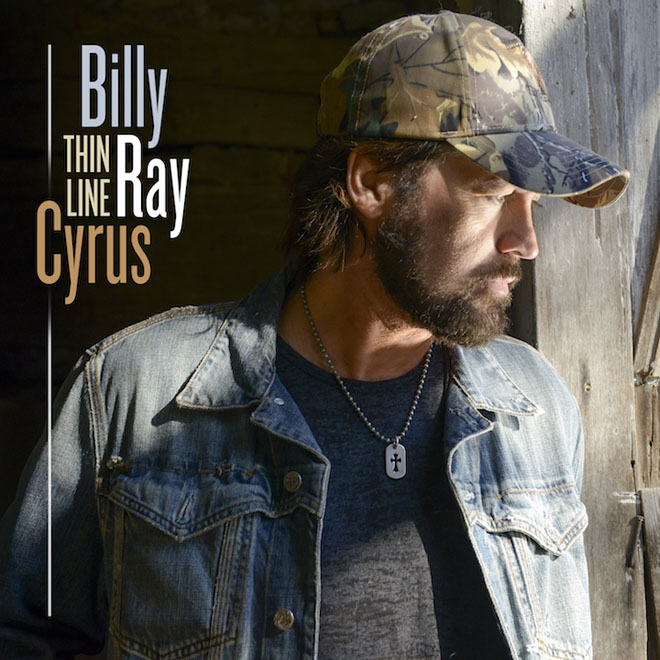
THIN LINE – Track List, with Billy Ray Cyrus’ thoughts about each song.
1. Thin Line (Billy Ray Cyrus)—featuring Shelby Lynne: “This song describes how I live my life; it’s a balance between art and reality. And Shelby Lynne’s velvet voice is icing on the cake.”
2. Loving Her Was Easier (Kris Kristofferson)—originally recorded by Kristofferson on The Silver Tongued Devil and I (1971): “These lyrics are so intricate to me and it’s always been a difficult song to memorize, but it is near and dear to my heart. The original intent of this album was to salute my songwriting heroes and Kristofferson is certainly one of them.”
3. They’re Playin’ Our Song (Billy Ray Cyrus): “About two years ago, I was invited by Dave Stewart to sing ‘Hey Jude’ at the Hollywood Bowl’s three-day 50th anniversary concert for the Beatles. That third day was special because it was my birthday and my gift to myself was the idea for this song. It just came to me and made sense. ‘Hey Jude’ in a way is ‘our song’ [the song of popular culture] and I began thinking of couples who have a special song and the lyric wrote itself.”
4. My Heroes Have Always Been Cowboys (Mary Sharon Vaughn)—originally recorded by Willie Nelson on The Electric Horseman (1979): “The concept to record this song stems from my love for Willie Nelson—and who doesn’t want a cowboy as their hero?”
5. Stop Picking on Willie (Billy Ray Cyrus): “I wrote this in 1989 when I was gigging around West Virginia and Ohio. I never recorded it previously, although it had a tremendous following and I’ll never forget Willie singing it with me at Farm Aid in 1995.”
6. Sunday Morning Coming Down (Kris Kristofferson)—featuring Shelby Lynne—originally recorded by Ray Stevens on Have a Little Talk with Myself (1969): “I love this song and actually think of Johnny Cash and his performance on The Johnny Cash Show before the other versions. I always felt a special presence with Johnny and he inspires me still—when I read the words he wrote to me in a letter of encouragement from 1992.”
7. Tulsa Time (Danny Flowers)—featuring Joe Perry—originally recorded by Don Williams on Expressions (1978): “The irony behind this cover is that it’s Vernon’s [main character in Still The King television series in which Cyrus stars] most successful hit.”
8. Hillbilly On (Billy Ray Cyrus): “This song is a living, breathing party.”
9. Killing The Blues (Rowland Jon Salley)—featuring Shooter Jennings—originally recorded by John Prine on Pink Cadillac (1979): “It was when recording this song that Rolling Stone quoted Shooter Jennings calling me the so-called, ‘Freddie Mercury of country’ and our harmonies created this special darkness.”
10. I’ve Always Been Crazy (Waylon Jennings)—featuring Shooter Jennings & Lee Roy Parnell—originally recorded by Waylon Jennings on I’ve Always Been Crazy (1978): “Waylon always said to me, ‘Cyrus, I can hear you singing, “I’ve Always Been Crazy.” Do you know the definition of an outlaw?’ Here I am now with it recorded and tracked alongside his son. And with Lee Roy Parnell—magic.”
11. Hey Elvis (Bryan Adams and Gretchen Peters)—originally recorded by Bryan Adams on MTV Unplugged (1997): This up-tempo track, previously recorded by Cyrus, features Bryan Adams and Deep Purple’s Glenn Hughes with lyrical references to the lack of quality material since the passing of The King. “TCB”
12. Help Me Make It Through the Night (Kris Kristofferson)—featuring Kenley Shea Holm—originally recorded by Kristofferson on Kristofferson (1970): “This version of the song was made by the vocals of Kenley and her Marilyn Monroe-esque country sound.”
13. Hope (Let It Find You) (Andrew Rollins, Billy Ray Cyrus, Jason Charles Miller): “We wrote this during the time my friend Caitlin [Jenner] was transitioning and she was quoted saying, ‘I hope my experience can represent hope.’ And when Glenn Hughes heard the song, he immediately said, ‘If the world ever needed hope, it’s now,’ and added his edge to the track.”
14. Going Where the Lonely Go (Merle R. Haggard, Dean Roe Holloway)—featuring Braison Cyrus—originally recorded by Haggard on Going Where the Lonely Go (1982): “Merle Haggard. What more can I say? Merle sang on this track before his illness took over. To complete the record, my son Braison helped me pay tribute.”
15. Angels Protect This Home (Billy Ray Cyrus)—featuring Miley Cyrus: “This song was written as a chanted prayer. Miley began to sing about taking care of our planet, the animals and the air we breathe. I added some oohs and aahs and spoken prayer. It addresses our hope for our Mother.”



comment closed